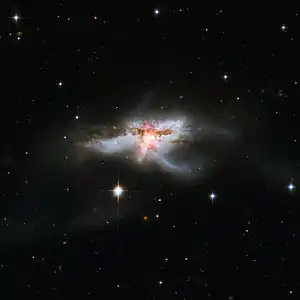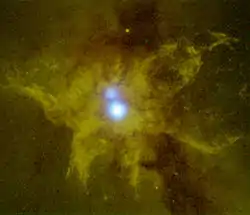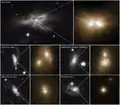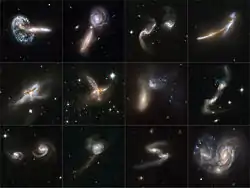NGC 6240
NGC 6240, also known as the Starfish Galaxy, is a nearby ultraluminous infrared galaxy (ULIRG) in the constellation Ophiuchus. The galaxy is the remnant of a merger between three smaller galaxies. The collision between the three progenitor galaxies has resulted in a single, larger galaxy with three distinct nuclei and a highly disturbed structure, including faint extensions and loops.[3]
| NGC 6240 | |
|---|---|
 At the centre of NGC 6240 there are three supermassive black holes spiraling closer and closer to one another.[1] | |
| Observation data (J2000 epoch) | |
| Constellation | Ophiuchus |
| Right ascension | 16h 52m 58.9s[2] |
| Declination | +02° 24′ 03″[2] |
| Redshift | 7339 ± 9 km/s[2] |
| Distance | 400 Mly |
| Apparent magnitude (V) | 12.8[2] |
| Characteristics | |
| Type | I0 pec[2] |
| Apparent size (V) | 2.1′ × 1.1′[2] |
| Notable features | merger remnant |
| Other designations | |
| IC 4625,[2] UGC 10592,[2] PGC 59186,[2] VV 617[2] | |
Double nuclei
Star formation versus supermassive black holes
The power sources of ULIRGs in general has been greatly debated. Infrared light from galaxies generally originates from dust in the interstellar medium. ULIRGs are abnormally bright in the infrared. The infrared dust emission in ULIRGs is over one trillion times more luminous than the Sun (i.e. it has an infrared luminosity of 1012 L☉). Astronomers have speculated that either intense star formation regions or active galactic nuclei (which contain supermassive black holes) may be responsible for the intense dust heating that produces this emission, although the general consensus is that both may be present in most ULIRGs. Studying the exact nature of ULIRGs has been difficult, however, because the dust in the centers of these galaxies obscures both visible and near-infrared starlight and because theoretical models of both starbursts and active galactic nuclei have demonstrated that they may look similar. Because NGC 6240 is a nearby example of such a ULIRG, astronomers have studied it intensively to understand its power source.
X-ray observations

Observations performed by Stefanie Komossa and collaborators with the Chandra X-Ray Observatory have detected strong hard X-ray emission from both of the nuclei. The intensity of this emission and the presence of emission from lowly ionized or neutral iron indicate that both of the nuclei are active galactic nuclei.[4] Presumably, these are the black holes that were originally at the centers of the two merging galaxies. Over the course of millions of years, the two black holes are expected to come closer together and form a binary supermassive black hole.
Recent studies by Wolfram Kollatschny and collaborators using the MUSE instrument on board the VLT have revealed that there are in fact three, not two, supermassive black holes at the core of this remnant. Their masses are suggested to be 90, 710 and 360 million solar masses.[5] Two of the three black holes are active. The additional SMBH implies that three original galaxies are merging instead of two.
Supernovae
Four supernovae have been observed in NGC 6240: SN 2000bg (Type IIn, mag. 17.4),[6] SN 2010gp (type Ia, mag. 17.5),[7] SN 2013dc (Type IIP, mag. 18.7),[8] and PSN J16525760+0223367 (type Ia, mag. 15.8).[9]
Final stages
A galaxy merger is a slow process lasting more than a billion years as two galaxies, under the inexorable pull of gravity, dance toward each other before finally joining together. After research done over the past few years, scientists have concluded that this galaxy has reached its last stages before colliding into one another. Photographic evidence proves that the two nuclei have been growing closer, and in that process, they have been emitting more gasses and stellar winds outward. Those winds evict about 100 solar masses in gases from the galaxy every year. These type of winds and growth of the black holes are known to occur during the last 10 to 20 million years of the merger; it is assumed that this is the amount of time left for the galaxy to finish its collision phase. [10] After this phase, the merged galaxies will become one, becoming a post-merger object until if and when any tidal tails and plumes evaporate.
Gallery
 Hubble and Keck observatories uncover black holes coalescing.[11]
Hubble and Keck observatories uncover black holes coalescing.[11]
See also
- Arp 220 – another ultraluminous infrared galaxy and merger remnant
- Antennae Galaxies – a nearby pair of merging galaxies
- NGC 520 – another merger remnant
- Markarian 273 – an ultraluminous infrared galaxy with two active nuclei
- UGC 5101 – another ultraluminous infrared galaxy with active nucleus
References
- "Hubble revisits tangled NGC 6240". Retrieved 12 June 2015.
- "NASA/IPAC Extragalactic Database". Results for NGC 6240. Retrieved 2006-08-16.
- Fried, J. W.; Schulz, H. (1983). "NGC 6240 – A unique interacting galaxy". Astronomy and Astrophysics. 118: 166–170. Bibcode:1983A&A...118..166F.
- Komossa, Stefanie; Burwitz, Vadim; Hasinger, Guenther; Predehl, Peter; et al. (2003). "Discovery of a Binary Active Galactic Nucleus in the Ultraluminous Infrared Galaxy NGC 6240 Using Chandra". Astrophysical Journal. 582 (1): L15–L19. arXiv:astro-ph/0212099. Bibcode:2003ApJ...582L..15K. doi:10.1086/346145. S2CID 16697327.
- Kollatschny, W; Weilbacher, P; Ochmann, M; et al. (January 2020). "NGC 6240: A triple nucleus system in the advanced or final state of merging". Astronomy & Astrophysics. 633: A79. arXiv:1910.12813. Bibcode:2020A&A...633A..79K. doi:10.1051/0004-6361/201936540. ISSN 0004-6361. Wikidata Q105750544.
- Transient Name Server entry for SN 2000bg. Retrieved 25 March 2023.
- Transient Name Server entry for SN 2010gp. Retrieved 25 March 2023.
- Transient Name Server entry for SN 2013dc. Retrieved 25 March 2023.
- Bright Supernovae - 2014. Retrieved 25 March 2023.
- Hille, Karl, ed. (2018-11-07). "Astronomers Unveil Growing Black Holes in Colliding Galaxies". NASA. Archived from the original on 2019-06-15. Retrieved 2018-11-26.
- "Hubble and Keck observatories uncover black holes coalescing". ESA / Hubble Space Telescope. 8 November 2018. Archived from the original on 8 November 2018. Retrieved 8 November 2018.
External links
- Merritt, David; Milosavljevic, Milos (2005). "Massive Black Hole Binary Evolution". Living Reviews in Relativity. 8: 8. arXiv:astro-ph/0410364. Bibcode:2005LRR.....8....8M. doi:10.12942/lrr-2005-8. S2CID 119367453. Archived from the original on 2012-03-30.
- NGC 6240: Two Supermassive Black Holes in Same Galaxy